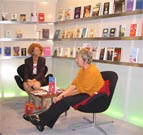Turkish publishing trade suffers as literary star rises
 Ankara - Turkey's role as special guest at this year's Frankfurt Book Fair is a great shot in the arm for the country's publishing industry, which has been suffering from a slowdown in sales just as Turkish literature hits new heights.
Ankara - Turkey's role as special guest at this year's Frankfurt Book Fair is a great shot in the arm for the country's publishing industry, which has been suffering from a slowdown in sales just as Turkish literature hits new heights.
The publishing sector is relatively new in Turkey. In Ottoman times, low literacy rates - in part thanks to the Arabic script in which Turkish was written - and the gulf between formal and folk Turkish meant that very few books were published at all.
With the birth of the Turkish Republic, founder Mustafa Kemal Ataturk introduced the Latin alphabet. Increasing primary and secondary school education led to rising literacy rates.
The Turkish government took it upon itself to publish books. Until the 1980s, it was the dominant player in the Turkish publishing sector.
Economic reforms in the 1980s by Prime Minister Turgut Ozal finally opened up the market to the private sector. From just a handful of private publishers in the early 1980s, Turkey today has some 1,700 publishing houses, even though many are extremely small.
The number of books published annually is around 32,000, according to the Turkish Publishers' Association.
The rise reflects an increase in reading among Turks, although this started from a very low base. The vast textbook publishing sector has also contributed to the rise.
But ironically, the textbook sector has taken some hits in the last few years due to government efforts to improve education.
The present government of Prime Minister Recep Tayyip Erdogan hit upon a popular cause when it decided to distribute textbooks free to all state school students.
The move tied in with the "Let's go to school, girls!" project, aimed at improving female attendance at schools so as to raise literacy levels across the poorest provinces, especially in south- east Turkey.
However, Metin Celal, secretary general of the Turkish Publishers' Association, told Referans newspaper in July that there has been a fall of around 20 per cent in book sales over the past year, partially due to increasingly difficult economic conditions, but also due to the government's policy of distributing free textbooks.
Celal said that the policy has resulted in many small bookstores in central Anatolia having to close, as selling textbooks had been a main part of their profits.
With the world heading towards economic difficulties, the short- term outlook for Turkey's publishing industry does not look great either.
As Turkish people slowly but surely get into a greater habit of reading and Turkish authors such as Nobel Literature Prize winner Orhan Pamuk continue to produce world-class literature, however, the future can only get brighter. (dpa)
